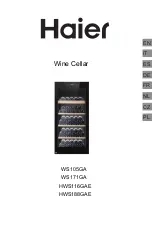
17
Before use
Remove all securing tapes.Wash inside the appliance
with lukewarm water and bicarbonate of soda (5 ml
to 0.5 litre of water).
Do not use soap or detergent as the smell
may linger. Dry thoroughly.
Freezing fresh food
The 4-star compartment is suitable for the long
term storage of commercially frozen food and for
freezing fresh food.
To freeze fresh foods it is not necessary to move
the thermostat knob from the normal setting. Push
the quick freeze switch at least 3 hours before
loading food.
In any 24 hours you can freeze up to 20 kg. of fresh food.
Place the food to be frozen in drawer 4 as indicated
in the diagram on page 5, as this is the coldest part.
To guarantee a good operation of the appliance during
normal use, the drawers should not be removed.
Frozen food storage
When using for the first time or after a period out
of use, before putting the frozen food products in
the compartment let the appliance run for at least
two hours on the coldest setting, then turn the
thermostat knob to the normal operating position.
Do not exceed the storage period indicated by the
manufacturer.
Finally, do not open the door frequently or leave it
open longer than is absolutely necessary.
Warning
Do not put carbonated liquids, (fizzy drinks etc.), in
the freezer compartment.
Ice lollies, if consumed immediately after removal from
the freezer, can cause low temperature skin burns.
Do not remove items from the freezer if your hands
are damp/wet, as this could cause skin abrasions or
“frost/freezer burns”.
Important
In the event of a power cut the food in the freezer
will not be affected if the power cut is short and if
the freezer is full. Do not open the door. Should the
food begin to thaw, it must be consumed quickly and
must not be re-frozen.
Thawing
Frozen food, prior to being used, can be thawed in
the fridge or at room temperature depending on the
time available. Small food items may even be cooked
from frozen; in this case cooking will take longer.
Any frozen food which is allowed to thaw
accidentally should either be eaten as soon as
possible or thrown away. Alternatively, if the food is
uncooked and has not been completely defrosted it
can be cooked and then refrozen.
Meat, fish and fruit should be thawed in the
refrigerator compartment and small pieces of meat
can even be cooked while still frozen, but you must
ensure that it is thoroughly cooked through.
Vegetables should be directly immersed in boiling
water; ready-cooked dishes can be placed directly in
the oven in their aluminium wrapping.
A microwave oven is particularly suitable for
thawing any type of frozen or deep-frozen food:
follow the oven instructions, particularly regarding
the placement of aluminium wrapping or containers
in the oven.
Defrosted cooked food must never be
refrozen.
Cold accumulators
Two cold accumulators are supplied in the freezer;
these increase the length of time the food will keep
in the event of a power failure or breakdown.
They must be placed in the top drawer.
Using the freezer








































